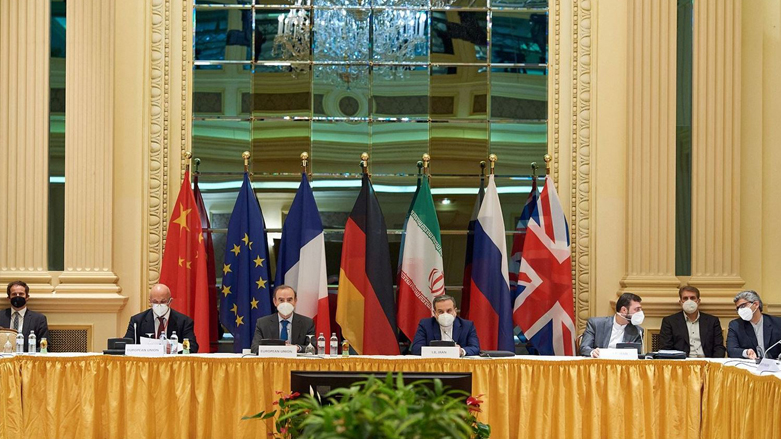US won’t divulge response to EU on Iran nuclear deal, as exchanges on ‘final’ text continue
Patel, however, repeatedly declined to provide any details of the US response, leaving the impression some issues remain to be resolved.

WASHINGTON DC, United States (Kurdistan 24) – Vedant Patel, State Department Principal Deputy Spokesperson, told journalists that the Department had given its response on Wednesday to Iran’s response to the European Union’s (EU) “final” text on reviving the 2015 Iranian nuclear accord, formally known as the Joint Comprehensive Plan of Action (JCPOA), which Donald Trump left in 2018.
Patel, however, repeatedly declined to provide any details of the US response, leaving the impression some issues remain to be resolved.
The revival of the nuclear deal is being vigorously promoted by the EU’s Foreign Policy Chief, Josep Borrell. While the EU has long favored a renewal of the JCPOA, that has been given major impetus, because of Russia’s assault on Ukraine.
The sanctions that Europe imposed on Russia in response include a prohibition on oil imports. But that sanction threatens to create an energy crisis in Europe, as winter approaches. Thus, the EU would very much like to see Iran resume its oil exports.
US Won’t Reveal Details of its Response
When the negotiations over reviving the JCPOA began after the Biden administration took office, it accepted Iran’s demand that it not be obliged to talk directly to Washington, and the EU acquired a prized role: intermediary in a major international agreement.
That has created the awkward and time-consuming situation, in which the US and Iran communicate through the EU. Last week, Iran gave its response to what Borrell calls the “final text” of an agreement, and Borrell then passed the Iranian response onto the US.
Read More: US continues negotiations with Iran over nuclear deal, despite mounting criticism
The US proceeded to study Iran’s response for over a week—until Wednesday, when Patel told journalists that the administration had passed onto the EU its response to Iran’s comments. The EU then passed the US comments onto Iran, which announced that it was studying Washington’s response.
Pressed by journalists to characterize the results of the administration’s extended review, Patel repeatedly declined to do so.
“Our review of [Iran’s] comments has now concluded,” Patel stated at Wednesday’s press briefing “and we have responded to the EU today.”
“We have conveyed our feedback privately, and I’m not going to get into further details from here today,” he continued. “If Iran is prepared to fully implement its commitments under the 2015 deal, then we’re prepared to do the same.”
Thus, as CNN reported, “It is not expected that the US will accept what Iran put forward without seeking changes and further negotiations.”
Iranian Aggression Increases, But Talks Continue
Negotiations over Borrell’s “final” text have continued despite Iran’s malign behavior, which has been increasing lately in key respects.
On Tuesday, the US carried out what CENTCOM described as “precision airstrikes” against “infrastructure facilities” in eastern Syria. They were “used by groups affiliated with Iran’s Islamic Revolutionary Guard Corps [IRGC]” to conduct a complex drone attack on August 15 against US troops in Deir ez-Zor, posted there as part of the fight against ISIS.
Read More: US conducts strikes on Iran-backed groups in Deir ez-Zor
The Associated Press, citing the Syrian Observatory for Human Rights and activist collective Deir Ezzor 24, reported that the US air strikes had targeted the Ayash Camp, where the “Fatimiyoun Group,” consisting of Shiite fighters from Afghanistan, is based.
However, the attack on “Infrastructure”—presumably, buildings—seems to have had little impact. It was followed a day later, on Wednesday by a second attack, which targeted two sites in northeastern Syria, where US forces are based. Three US service members were injured.
In addition, the US Justice Department recently charged that the IRGC had plotted to assassinate Amb. John Bolton, Trump’s National Security Adviser. In addition, a man with an assault rifle was arrested last month in New York outside the home of an Iranian-American, whom Iran had earlier tried to kidnap.
Read More: Iran plotted to assassinate Bolton, Pompeo
Moreover, a 24 year-old American, whose family had immigrated to the US from southern Lebanon, and who, himself, is an avowed Shi’a extremist, tried to kill the Indian-born author, Salman Rushdie, at a cultural festival in rural New York earlier this month.
Minimally, the assailant was inspired by Iran’s hostility toward Rushdie. Maximally, Iranian intelligence was involved in the plot.
Read More: Shi’a Extremist behind assault on Salman Rushdie
Although the revival of the JCPOA would make available billions of dollars to Iran through the release of frozen assets and sanctions relief, the Biden administration says this would not increase Iranian aggression.
Rather, the administration maintains that it was the US abrogation of the JCPOA that precipitated greater Iranian belligerence, as State Department Spokesperson Ned Price suggested on Tuesday.
“The pace of Iran-backed attacks after the last administration abandoned the JCPOA went up by 400 percent,” Price told journalists. “So the idea that a new strategy of so-called maximum pressure would somehow cow Iran into submission, not only in the nuclear realm, but also when it comes to its support for terrorist groups and proxies” is “a demonstrable failure.”
However, as Behnam Ben Taleblu, a senior fellow at the Foundation for the Defense of Democracies, advised Kurdistan 24, it does not follow that a return to the JCPOA will diminish Iranian attacks or that Iranian attacks will not increase, along with its rising revenues.
“As Washington continues its myopic nuclear focus, Iran’s non-nuclear threats, including missiles, terrorism, drones, proxy warfare, and arms proliferation have been evolving in scale and scope,” Ben Taleblu told Kurdistan 24.
“To think that an increasingly risk-tolerant and ultra-hardline government at the helm in Tehran today would feel more restraint, rather than less, would suggest a failure to understand the drivers and dampeners of the current standoff,” he cautioned.